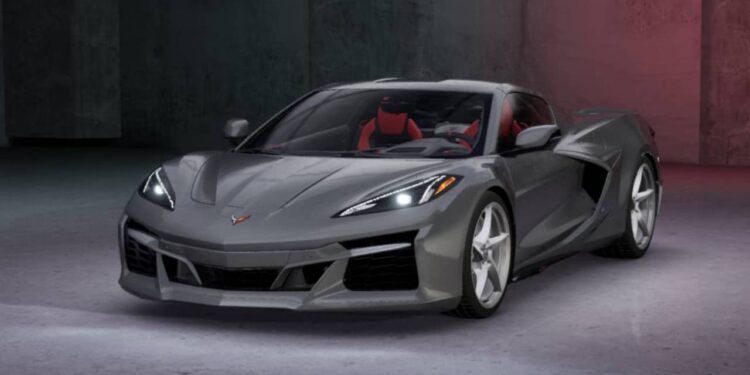The design of the Chevrolet Corvette E-Ray – the first hybrid Corvette – has been revealed early by an official online configurator.
Full details of the 2024 Chevrolet Corvette E-Ray hybrid have been leaked from within General Motors by an over-eager customer visualiser system (via Corvette forums).
Due in US showrooms next year, the Corvette E-Ray hybrid is shown to wear bodywork from the Z06, complete with its wider wheel arches, but missing the front splitter and rear wing, and with body-coloured accents instead of black.
The E-Ray name is a twist on the Stingray badge used by General Motors (GM) since 1963, and identifies the first electrified Corvette.
But the visualiser pictures show no hint of a plug-in charging point, which identifies the E-Ray as a hybrid – not a plug-in hybrid – and its quad exhaust pipes indicate the continued use of the Corvette’s mid-mounted V8.
Apart from its landmark electrification, the E-Ray will also be the first Corvette to use all-wheel drive as its petrol engine is expected to power the rear wheels, while one or two electric motors feed drive to the front wheels.
The hybrid E-Ray comes after reports of a battery-powered Corvette sub-brand, as reported by Drive, due in 2025 with coupe and SUV models.
Details of the E-Ray, including new body and trim colours, were revealed when the visualiser website went live ahead of time and was quickly spotted by a Corvette forum before it was by GM.
They also reveal the E-Ray badging for the car, with a large blue ‘E’ in the colour now commonplace for hybrid and electric models from many brands.
They show the E-Ray is the third model in the ‘C8’ Corvette series – the first of the breed with a mid-mounted engine – following the Z06 in 2021, and the Stingray in 2019.
The C8 is also the first Corvette to be built with factory right-hand drive at GM’s factory at Bowling Green in Kentucky – and spy photos and a new report from GM Authority suggest the E-Ray will be too, paving the way for a launch in Australia.
The Chevrolet Corvette E-Ray is identified in the visualiser as a 2024 model, which means production and deliveries in the USA could start in late in 2023, ahead of a possible arrival in Australia in 2024.






